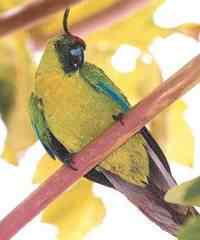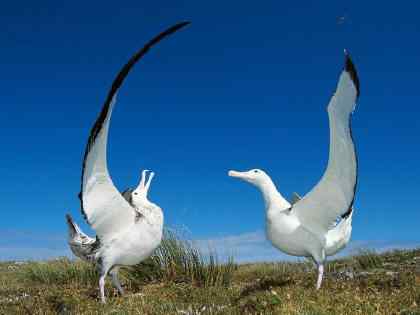布什临别总算作了一件好事
咦,为什么在这里谈政治?只是说,小布什向参议院推荐国际保护信天翁与海燕的协议。美国一直对很多全球环境保护条约不很感到兴趣,不太积极;这次总算是为保护海鸟作了一件好事。这项协议从2001年至今共有11个国家参加(阿根廷、澳大利亚、智利、厄瓜多尔、法国、新西兰、挪威、秘鲁、南非、西班牙、英国),巴西签署了但尚未参加。值得注意的是这些参加国多是南半球活在南半球有属地的国家,因为信天翁种类主要在南部的大洋,美国签署以后,我们觉得可能会推动亚洲一些渔业大国的参与(如日本,韩国),无论是捕鱼或者消费,将来中国肯定是对信天翁和海燕类十分重要的国家。
American seabirds thrown a lifeline
17-10-2008
President George W. Bush has presented The Agreement for the Conservation of Albatrosses and Petrels (ACAP) to the US Senate for approval. “I believe the Agreement to be fully in the U.S. interest”, wrote President Bush.
ACAP is an international treaty between nations. “Its provisions advance the U.S. goals of protecting albatrosses and petrels. I recommend that the Senate give early and favorable consideration to the Agreement and give its advice and consent to accession”, stated President Bush.
"Albatrosses and petrels are facing growing threats, but if we move quickly on the provisions contained in this treaty, they stand a chance for survival," said Betsy Loyless, Audubon's (BirdLife in America) Senior Vice President for Policy.
"Seabirds tell us much about the health of the world's oceans and ACAP offers a united approach to seabird conservation. President Bush's recommendation for the United States to approve ACAP is welcome support for this urgent legislation", commented Dr Stephen Kress, Audubon's Vice President for Bird Conservation.
The USA will join twelve countries which are currently parties of the treaty. These are Argentina, Australia, Brazil, Chile, France, Ecuador, New Zealand, Norway, Peru, the Republic of South Africa, Spain and the United Kingdom.
"I believe the Agreement to be fully in the U.S. interest. Its provisions advance the U.S. goals of protecting albatrosses and petrels” —George W. Bush, US President
“Seabirds are among the most magnificent and threatened birds on earth, yet are often overlooked,” said George Fenwick, president of American Bird Conservancy. “We applaud the President for extending his support of migratory birds to this vulnerable group.”
The next steps are for the U.S. Senate to ratifying the treaty, and produce laws which will implement the agreement. "We strongly urge the Senate to approve the treaty as quickly as possible", commented John Croxall, Chair of BirdLife’s Global Seabird Programme. “U.S. participation in ACAP offers an important opportunity to engage other countries in the protection of seabirds when they range outside of U.S. waters”.
The United States has been an active participant in the work of the Agreement, attending both preparatory meetings and subsequent meetings of ACAP’s Advisory Committee and Meeting of the Parties. “It has been, and continues to be, very influential in international efforts to conserve these magnificent global wanderers,” said Warren Papworth, ACAP Executive Secretary. “By joining the Agreement, the United States will send a clear message to the international community of its resolve to prevent the extinction of albatrosses and petrels.”
Ten out of the 22 albatross species are Critically Endangered or Endangered, and another eight are considered to be Vulnerable to Extinction, according to the Red List of Threatened Birds – which BirdLife maintains on behalf of the IUCN. The most important threats to these species are accidental deaths in longline and trawl fisheries, and loss of eggs and chicks to introduced predators on breeding islands. Solving these problems requires coordinated efforts by governments, scientists, fishermen, and conservation organisations.
“International coordination, such as that offered by ACAP, is the only way to ensure that our future generations will also be able to enjoy these birds” —Ben Sullivan, BirdLife’s Global Seabird Programme Coordinator
“Migratory species such as seabirds cannot be protected by the actions of one country alone”, added Ben Sullivan BirdLife’s Global Seabird Programme Coordinator. “International coordination, such as that offered by ACAP, is the only way to ensure that our future generations will also be able to enjoy these birds.”
BirdLife’s Albatross Task Force (ATF) is a major grass-roots contribution to meeting ACAP’s goals. The ATF is the world’s first international team of mitigation instructors working with fishermen on land and on deck, along with government agencies, to reduce seabird bycatch. ATF instructors routinely show that the adoption of conservation measures are both operationally and economically effective. To support the work of the ATF













发表评论:
◎欢迎参与讨论,请在这里发表您的提问或看法,交流您的观点。